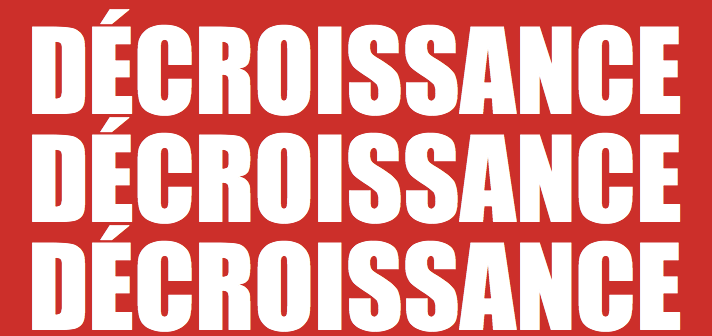In the wake of the last provincial elections and following the second “Warning to Humanity” published in the journal BioScience in November 2017, the community is awakening to the urgency of taking action on the environment. Many citizens are implementing changes in their way of life, adopting buying local and the zero waste lifestyle for example. A wave of protest also surfaced during the election campaign under the force of the “The planet is invited to parliament” demonstrations. The last edition, taking place on November 10, led to citizen demonstrations in the streets of several cities in Quebec. In Montreal, more than 50,000 demonstrators marched to encourage collective and government awareness of the urgency to act.

The Planet invites itself to parliament, in Montreal – Mathieu Dupuis
The main lines
Little by little, a new ideology is quietly taking place: degrowth. It was in 1972, the year in which the very first international meeting of an environmental nature took place in Stockholm, that the first major report on the dangers of continued economic growth in a world with finite resources was published. This report reported a breaking point in 2030, a breaking point still set in 2030 in the 2000s. On the other hand, in 2017, scientists rather report an earlier breaking point ( LeFigaro , 2017). The objective is no longer to find a way to avoid exceeding our resources, but to reintegrate the limits.
Our societies are based on a basic capitalist system that promotes mass consumption for the sole purpose of creating profit. Degrowth is a movement that goes against the current economic system. It encourages us to rethink all the structures of our societies, focusing on the production of the goods we need according to the limits of our natural resources. At the current rate, the increase in world population and the desire of developing countries to match the pace of industrialized countries are leading to the disappearance of biodiversity as well as an increase in social crises and climate refugees. The objective of degrowth is to review the very foundations of our society in order to bring to it an enlightened reflection on our real needs and the impact of our standard of living. Rather than accepting the imposed pace, many citizens seek to change individual and collective lifestyles.
A major global impact
Industrialization and globalization rely on the production of cheaper goods. In fact, the environmental and human costs are often catastrophic. Buying new rather than repairing defective goods not only wastes natural resources, but also exploits the labor force, in addition to increasing energy consumption, pollution and the production of waste. We must stop believing that what is new is necessarily better, but rather encourage small-scale sustainable production. This vision leads society to use resourcefulness and creativity in its economic system, rather than taking the easy way out.

credit: Le Devoir , Annik MH de Carufel
According to degrowth experts, adopting a simpler way of life would lead not only to environmental benefits, but also to society. By promoting goods that meet essential needs, mass production would be significantly reduced, as would the need for monetary and human resources. In an ideal decreasing society, citizens would work part-time so that free time would no longer be seen as rest time, but as community time. Working less would also allow them to be self-sufficient and to reassess their relationship with time and space. A society that promotes walking, cycling, public transport and local commerce is also a society with better mental and physical health ( Le Manifeste, 2018).
Our turn now
On a human scale, betting on the development of the community promotes mutual aid, the exchange of goods, services and knowledge. In this way, the autonomy and freedom of individuals to educate themselves are growing. This also allows the citizens to do useful work in their own way and have a positive impact on the community. Several solidarity cooperatives following this mentality have emerged in recent years. Whether it's Building 7 in Pointe-Saint-Charles or La Remise in Villeray, their instigators have given themselves the mission of offering a space for sharing, interdependence and autonomy that fosters a more responsible community spirit.
Here are some other links that might be useful if you want to read up on the subject. To learn more about your own ecological impact, visit the Global Foot Print website. You can also learn more about degrowth by reading Rad 's very interesting file. Don't hesitate to sign the Transition Pact which aims to encourage the collective effort for a greener world. I strongly invite you to watch the documentary Tomorrow , a magnificent expedition around the world to find solutions for a better world.

Reviewed By Melanie






































Leave a comment
This site is protected by hCaptcha and the hCaptcha Privacy Policy and Terms of Service apply.